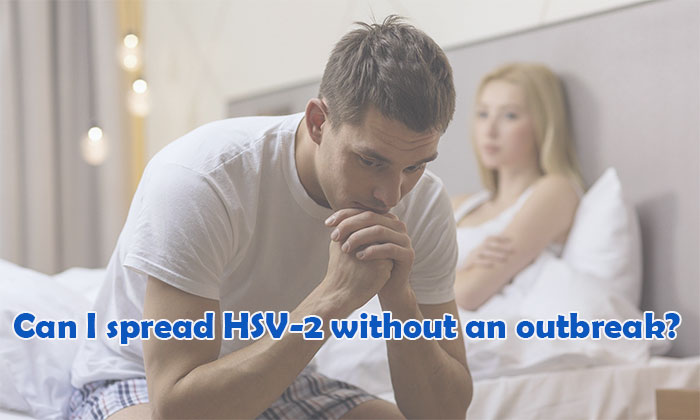Can I spread HSV-2 without an outbreak?
Herpes simplex virus type 2 (HSV-2) is a common sexually transmitted infection (STI) that affects millions of people worldwide. It is known for causing recurrent outbreaks of painful genital sores, but there is often confusion and concern about whether the virus can be spread when no visible symptoms are present.
A common question among those diagnosed with HSV-2 is, "Can I spread HSV-2 without an outbreak?" The short answer is yes, HSV-2 can be transmitted even when there are no visible symptoms. This phenomenon, known as asymptomatic viral shedding, underscores the importance of understanding the virus's nature, transmission risks, and prevention strategies.

Understanding HSV-2
HSV-2 is a lifelong infection caused by the herpes simplex virus. It primarily affects the genital region but can also be transmitted to other areas, such as the mouth or anus, through direct contact. After the initial infection, the virus resides in nerve cells near the spinal cord, entering a latent phase.
While many people associate herpes transmission with visible outbreaks—characterized by sores or blisters—the virus can be active even when symptoms are absent. This means individuals with HSV-2 can unknowingly transmit the virus during intimate contact.
What Is Asymptomatic Viral Shedding?
Asymptomatic viral shedding occurs when the virus replicates and sheds from the skin or mucous membranes without causing noticeable symptoms. During these periods, HSV-2 can be present on the surface of the skin, making transmission possible even in the absence of an outbreak.
Research has shown that:
- Asymptomatic shedding occurs more frequently in the first year following infection.
- Shedding episodes decrease over time but never completely stop.
- The virus is more likely to shed from areas where outbreaks have previously occurred.
How Often Does Asymptomatic Shedding Happen?
The frequency of asymptomatic shedding varies from person to person. Studies indicate that HSV-2 sheds asymptomatically on approximately 10–20% of days in individuals with recurrent outbreaks. For those with infrequent or no outbreaks, shedding still occurs but is less frequent.
Certain factors can increase the likelihood of viral shedding, including:
- Recent Infection: The first year of infection typically involves more frequent shedding.
- Immune System Suppression: Illness, stress, or immunosuppressive conditions may contribute to viral activity.
- Sexual Activity: Friction during sexual activity can sometimes trigger asymptomatic shedding.
How Is HSV-2 Transmitted Without Symptoms?
Asymptomatic viral shedding occurs when HSV-2 becomes active and replicates in the body without causing visible signs such as sores or blisters. During this time, the virus can shed from the skin or mucous membranes, making transmission possible through direct contact.
Viral shedding is most likely to occur in areas where outbreaks have previously appeared, but it can also happen in nearby regions. For HSV-2, these areas typically include the genitals, anus, and inner thighs.
Modes of Transmission
HSV-2 is primarily transmitted through direct skin-to-skin contact. Even without visible symptoms, the virus can spread through:
- Genital-to-Genital Contact: This is the most common mode of HSV-2 transmission. The virus can pass from one partner's skin to another's during sexual activity.
- Genital-to-Oral Contact: While HSV-2 is less likely to infect the oral region, it can occur if a partner's mouth comes into contact with the infected area.
- Genital-to-Anal Contact: HSV-2 can also spread through contact with the anus or surrounding skin.
It's important to note that condoms and dental dams significantly reduce the risk of transmission but cannot completely eliminate it. HSV-2 can shed from areas not covered by these protective barriers.
Factors Increasing Transmission Risk
Certain factors may make asymptomatic viral shedding more likely, thereby increasing the risk of transmission:
- Recent Infection: Those who were recently infected with HSV-2 tend to shed the virus more frequently.
- Immune Suppression: Stress, illness, or conditions that weaken the immune system can increase viral activity.
- Sexual Activity: Friction during sexual activity may trigger shedding in some cases.
While asymptomatic shedding makes HSV-2 transmission possible without symptoms, taking steps such as using protection, practicing daily antiviral therapy, and avoiding sexual contact during potential shedding periods (e.g., during prodromal symptoms) can significantly reduce the risk.
Worry about herpes tranmission? Meet nearby people with herpes

PositiveSingles is one of the most popular dating websites for people suffering from herpes and other STD. It was initiated in 2001. With 1,510,800+ members you are sure to find lots of potentail people around you.
Join and meet nearby people with herpes, browse profiles and chat now!
How Likely Is It to Spread HSV-2 Without an Outbreak?
Herpes Simplex Virus Type 2 (HSV-2) is a sexually transmitted virus that can be spread even when no visible symptoms, such as sores or blisters, are present. This transmission occurs due to asymptomatic viral shedding, where the virus becomes active and sheds from the skin or mucous membranes without noticeable signs.
How likely is it to spread HSV-2 without an outbreak? What are the chances of transmitting herpes without an outbreak? we will explore the transmission dynamics of HSV-2, including the potential for spreading the virus without experiencing an outbreak. Several factors affect transmission risk, including whether protective measures are used, if antiviral medication is taken, and the frequency of sexual activity. Below, we'll explore these risks under different conditions and offer practical ways to reduce them.
Transmission Risk Without Symptoms: Key Factors
Herpes Simplex Virus Type 2 (HSV-2) can spread even in the absence of visible symptoms, primarily due to asymptomatic viral shedding. Understanding the factors that influence transmission—such as shedding frequency, protective measures, and antiviral use—is crucial for reducing risk and making informed decisions in managing sexual health.
1. Asymptomatic Viral Shedding Frequency
Asymptomatic viral shedding is unpredictable but plays a significant role in transmission. Studies show that individuals with HSV-2 shed the virus asymptomatically on approximately 10–20% of days annually. Shedding is more frequent in the first year after infection and tends to decline over time, although it never stops entirely.
Shedding occurs in areas where outbreaks typically happen, but it can also affect nearby regions, including the inner thighs or buttocks. Since shedding isn't accompanied by visible signs, people with HSV-2 may unknowingly transmit the virus during sexual contact.
2. Transmission Risk per Encounter and Annually
The likelihood of transmitting HSV-2 without symptoms varies depending on whether protective measures are used. Below are estimates based on different conditions:
Without Protection or Medication
- Risk per sexual encounter: ~10%.
- Yearly transmission risk: ~8–10% (female-to-male) or ~10–20% (male-to-female) with regular sexual activity (2–3 times per week).
Notes: Women are biologically more susceptible to HSV-2 due to the larger surface area of mucosal tissue, which allows easier viral entry.
With Daily Antiviral Therapy (e.g., Valacyclovir)
- Risk per sexual encounter: ~5%.
- Yearly transmission risk: Reduced by ~50%.
Notes: Antiviral medications reduce the frequency of viral shedding and the viral load, making transmission less likely.
With Condom Use Only
- Risk per sexual encounter:~3–5%.
- Yearly transmission risk:Reduced by ~30%.
Notes: Condoms provide a physical barrier, but HSV-2 can still shed from areas not covered by the condom, such as the base of the genitals or nearby skin.
With Antiviral Therapy and Condom Use Combined
- Risk per sexual encounter:~1–2%.
- Yearly transmission risk:Reduced by ~75%
Notes: Combining these methods offers the highest level of protection while maintaining an intimate relationship.
3. Factors Increasing the Risk of Transmission
Certain conditions may heighten the likelihood of asymptomatic viral shedding and transmission:
- Recent Infection: Shedding is most frequent in the first year following an initial outbreak.
- Immune Suppression: Stress, illness, or conditions that weaken the immune system can trigger increased viral activity.
- Sexual Activity: Friction during intercourse can sometimes stimulate viral shedding in areas of past outbreaks.
- Prodromal Symptoms: Even without visible sores, sensations such as tingling, itching, or burning in the genital region may indicate viral shedding.
How to lower the chances of spreading herpes
While it's impossible to eliminate the risk of HSV-2 transmission entirely, there are several effective strategies for reducing it:
- 1. Use Protection Consistently Condoms and dental dams significantly lower the risk of spreading HSV-2, but they do not provide 100% protection because the virus can shed from uncovered areas. Despite this limitation, condoms reduce transmission by approximately 30% overall.
- 2. Take Daily Antiviral Medication Antiviral drugs like valacyclovir or acyclovir reduce the frequency of viral shedding by around 70% and lower the risk of transmission to a partner by about 50%. These medications are particularly effective for individuals with frequent outbreaks or those in serodiscordant relationships (where one partner has HSV-2 and the other does not).
- 3. Avoid Sexual Contact During High-Risk Periods While asymptomatic shedding can occur without warning, certain periods may carry higher risks. If prodromal symptoms (tingling, itching) are present, abstaining from sexual activity is strongly recommended.
Worry about herpes tranmission? Meet nearby people with herpes

PositiveSingles is one of the most popular dating websites for people suffering from herpes and other STD. It was initiated in 2001. With 1,510,800+ members you are sure to find lots of potentail people around you.
Join and meet nearby people with herpes, browse profiles and chat now!
What are the chances of transmitting herpes without an outbreak?
What are the odds of passing HSV-2 without an outbreak? The chances of transmitting herpes (HSV-2) without an outbreak are not zero, but they are generally lower than during an active outbreak when visible symptoms like sores or blisters are present. Transmission of herpes without visible symptoms is often referred to as asymptomatic shedding.
What are the chances of passing HSV-2 without an outbrak? Research indicates that the risk of transmission during asymptomatic shedding is approximately 3-5% per year for discordant couples (where one partner has HSV-2, and the other does not) when no preventive measures are used. The risk of transmission during an outbreak is estimated to be around 10-20% per sexual encounter without the use of preventive measures.
Can I spread HSV-2 without an outbreak? Conclusion
While the risk of transmitting HSV-2 is higher when visible symptoms are present, it is essential to be aware that the virus can still be spread during asymptomatic shedding. Taking steps to manage the infection, such as antiviral medication and safe sexual practices, can significantly reduce the risk of transmission. Open communication with sexual partners is also crucial to make informed decisions about sexual activity and protect both parties. If you have concerns or questions about HSV-2, consult a healthcare provider for guidance and support.
Positive Singles: The #1 dating site to meet other people with herpes

PositiveSingles is one of the most popular dating websites for people suffering from herpes and other STD. It was initiated in 2001. With 1,510,800+ members you are sure to find lots of potentail people around you.
